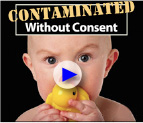Open Letter to the U. S. Food and Drug Administration from the Workgroup for Safe Markets
June 8, 2011
Commissioner Margaret Hamburg
Food and Drug Administration
10903 New Hampshire Ave
Silver Spring, MD 20993-0002
Dear Commissioner Hamburg,
We are writing in response to the U.S. Food and Drug Administration's recent publication of research that shows that BPA leaches from the linings of canned foods into the foods themselves. As members of the Workgroup for Safe Markets, and authors of No Silver Lining: An Investigation into Bisphenol A in Canned Foods (May 2010), we were not surprised to see the results of FDA’s study; they are consistent with our report and several others. Both FDA and the Workgroup for Safe Markets found wide range of BPA levels in canned vegetables, including very high levels – FDA found 730 ppb in green beans; we reported 1,140 ppb. These levels are sufficient, if just a few servings were consumed, to expose a pregnant woman to BPA at levels linked in animal studies to aggression, reproductive problems and increased cancer risk.
FDA's findings were publicized nearly a year after No Silver Lining was made public. In that year, it is unfortunate that FDA has focused on investments in research alone instead of taking steps to protect the public. FDA’s public advice on reducing BPA exposures — as presented by the Department of Health and Human Services — completely ignores canned foods (aside from infant formula cans) as a source of BPA exposure.
This failure on FDA's part continues to leave us all vulnerable to the health affects of BPA exposure, which can have particularly troubling consequences for pregnant women and their children. In fact, a recently published report found that women exposed to BPA while pregnant had infants who experienced wheezing and respiratory distress. While this does not appear to be a life-long condition — symptoms dissipated after the child was a year old — no parent wants to see their newborn struggling for air. And, as FDA is aware, other studies indicate the low-dose exposures to BPA can have longer-lasting health impacts, including increased risk for cancers, behavioral, reproductive and cardiovascular problems.
It is clear that pregnant women are exposed to BPA — a separate study recently identified a pregnant woman with the recorded highest ever level of BPA — 583 ug/g (creatine corrected) who consumed substantial amounts of canned and packaged foods during the week her sample was collected. Perhaps most importantly, Silent Spring Institute and Breast Cancer Fund published a study this spring that demonstrated that, simply by removing packaged foods from their diet for three days, five families were able to reduce their BPA levels by an average of 60%.
While it is important to more fully understand the health effects of BPA, further research should not impede immediate actions to protect the public. BPA has no place in our food supply.
FDA has stated that it “will support changes in food can linings and manufacturing to replace BPA or minimize BPA levels where the changes can be accomplished while still protecting food safety and quality. FDA will support efforts to develop alternatives for other can lining applications similar to those which are already being tested for liquid infant formula packaging.”We appreciate this positive statement from the FDA, but more needs to be done.
We are calling on FDA to use all of its existing authority to protect Americans from BPA in their food supply now, instead of waiting for results of research to be reported. Specifically, we call on FDA to:
- Actively warn the public about health concerns from BPA in the linings of most canned foods, including updating its website with more clear information aimed at pregnant women.
- Go beyond simply “supporting” can manufacturers and actively work with them — either by voluntary engagement or through regulatory authority — to develop and implement safer can lining materials, free of chemicals linked to harm or chemicals that have never been assessed for safety. FDA’s active involvement could help accelerate can manufacturers efforts.
- Seek true solutions to this problem through BPA replacements and not settle for mitigating BPA transfer into foods. While not in FDA’s purview, workers in can manufacturing facilities are highly exposed to BPA, which research suggests may negatively impact fertility.
A number of retailers and canned goods makers have announced transitions to BPA-free packaging, including Kroger, Eden Foods, General Mills (for its Muir Glen brand of tomatoes), and Whole Foods Market. However, FDA has the power to engage the can makers directly. These companies have the power to transform the sector as a whole.
FDA initially required cans to be lined to protect the public from one health threat - botulism. The unintended consequence was exposing the public to another health threat - the diseases and health conditions linked to BPA exposure. This is not a choice the public should have to make. Food packaging should be safe, period. This is what Americans expect, and it is what FDA has a responsibility to ensure.
We hope to hear of FDA action steps — not just further research — before September 2011. Please contact me at clean.bobbi@gmail.com, or by mail at 62 Grand Street, Albany, NY 12207.
Sincerely,
Bobbi Chase Wilding
BPA Coordinator
On Behalf of the Workgroup for Safe Markets
Organizations part of the Workgroup for Safe Markets
- Alliance for a Healthy Tomorrow
- Breast Cancer Fund
- Center for Health, Environment & Justice
- Clean and Healthy New York
- Clean Water Action
- Coalition for a Safe & Healthy Connecticut
- Ecology Center
- Environmental Defence (Canada)
- Environmental Health Fund
- Environmental Health Strategy Center
- Environment Illinois
- Healthy Legacy Coalition
- Indiana Toxics Action Project
- Kentucky Environmental Foundation
- Learning Disabilities Association of America
- National Work Group for Safe Markets
- Oregon Environmental Council
- US PIRG
- Washington Toxics Coalition
- Women’s Voices for the Earth
# # #




